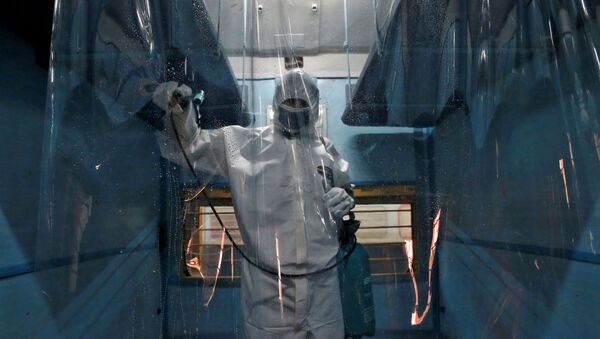Long after an incident in which chemical disinfectants were spayed on a group of migrant workers in Uttar Pradesh, India’s federal health ministry has come out with an advisory that “spraying of individuals or groups is NOT recommended under any circumstances”, as such acts are both “physically and psychologically harmful”.
Why it took so long for @MoHFW_INDIA to come up with such an advisory? Several hospitals & establishments have set up spray doors. Even streets are sprayed with disinfectants. The most shameful incident was spraying chemical disinfectants on poor migrant workers in UP. pic.twitter.com/OUftba9iBG
— NB Nair (@nbnair) April 19, 2020
Several states like Uttar Pradesh, Andhra Pradesh, Telangana, Tamil Nadu and Karnataka have deployed drones to spray disinfectants onto streets, but the federal Health Ministry said that there was “no scientific evidence” to suggest that it was effective.
“Even if a person is potentially exposed to the COVID-19 virus, spraying the external part of the body does not kill the virus that has entered your body,” reads the federal Health Ministry’s latest advisory.
The advisory said, on the contrary, that spraying chlorine on individuals can irritate the eyes and skin and potentially induce nausea and vomiting.
The advisory noted that such measures could only give a “false sense of disinfection and safety and actually hamper the public observance of hand washing and social distancing measures”.
The All India Institute of Medical Sciences in the nation's capital Delhi and Indian Railways have also installed fumigation tunnels to sanitise anyone entering through them.
The federal health ministry issued a detailed advisory at the outbreak of COVID-19 in the country that washing hands at regular intervals, wearing masks when venturing outside and practising social distancing could curb the spread of the coronavirus.
Ever since the first case of COVID-19 was detected in India on 30 January, the virus has spread throughout the country; the number of those affected has surpassed 15,000 cases as of Sunday, according to the federal Health and Family Welfare Ministry.
India has been under a lockdown since 25 March that was supposed to end on 14 April but was extended until 3 May to contain the spread of coronavirus. The federal government has, however, unveiled a graded plan to lift the lockdown for certain sectors beginning Monday (20 April).




